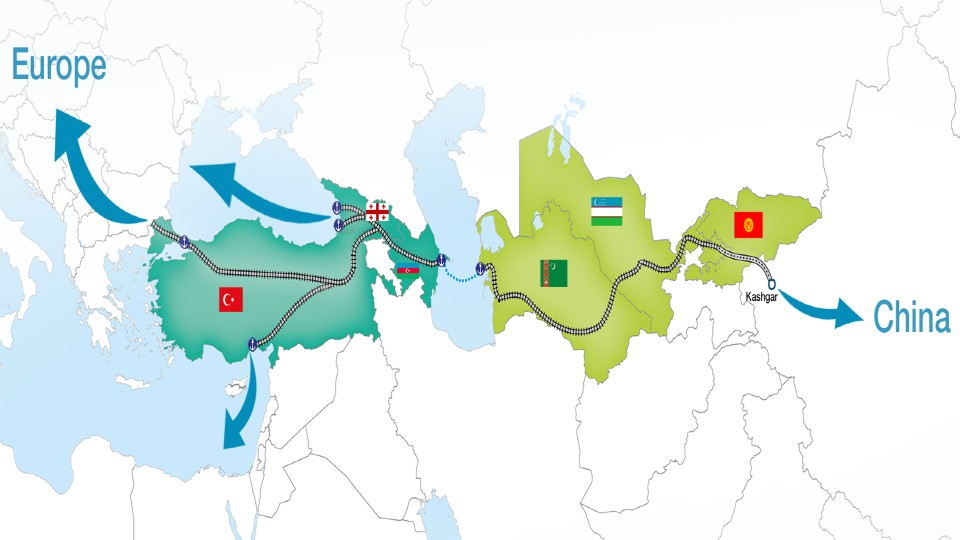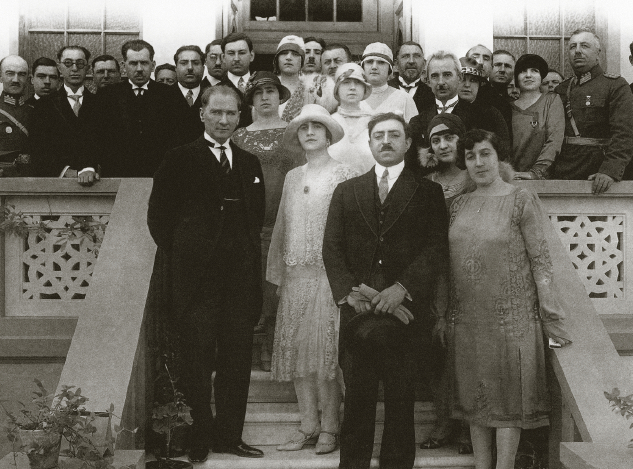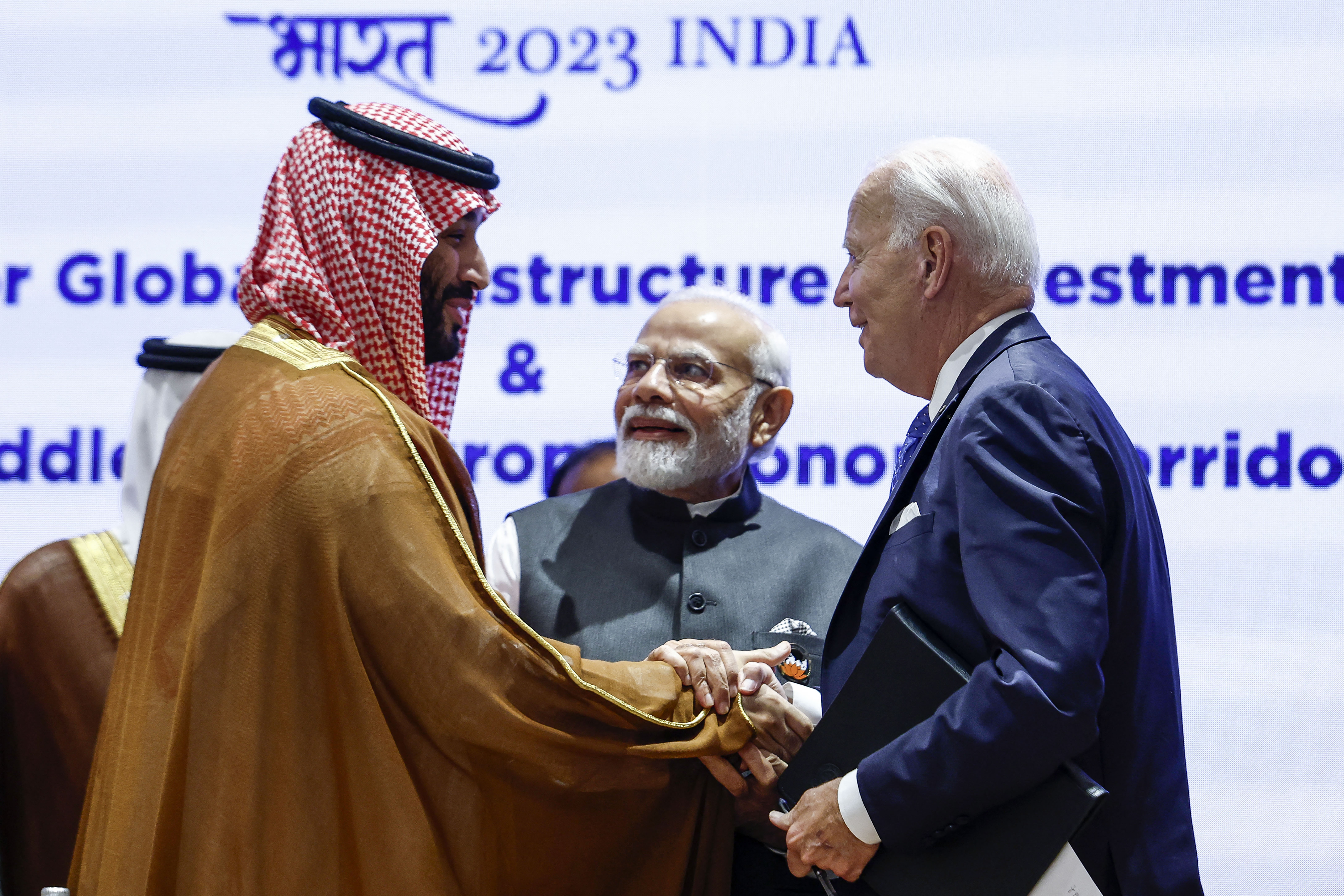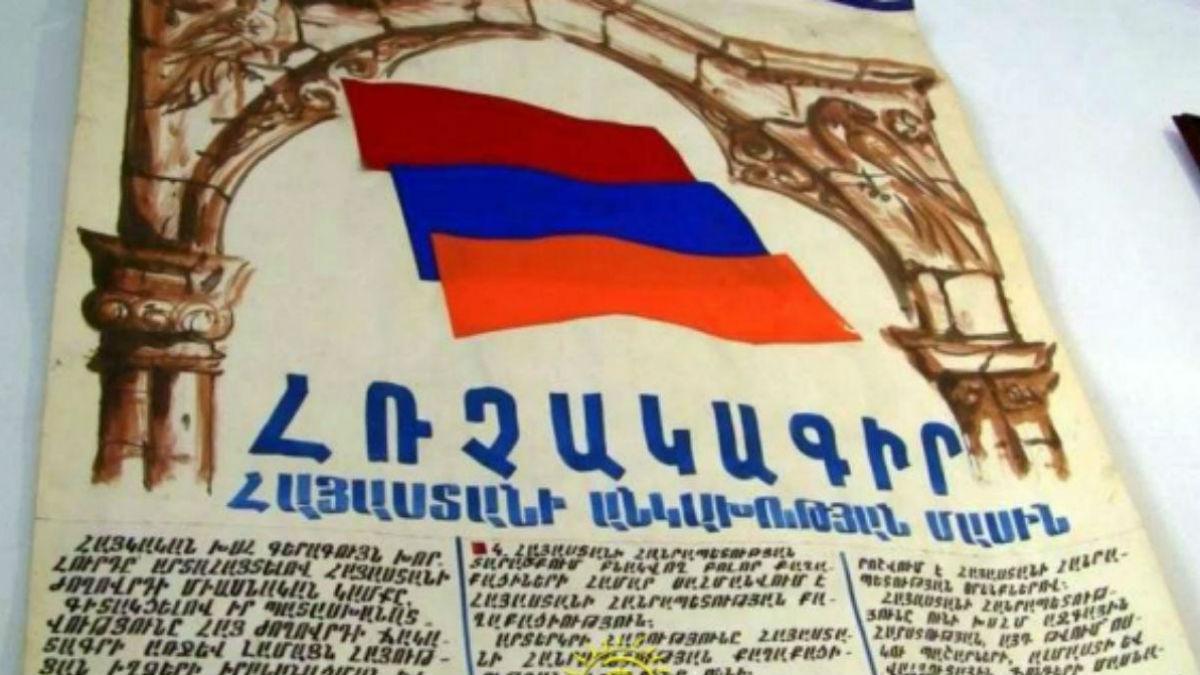
*This is the English translation of a Turkish language article that was originally published by AVİM on 7 July 2022.
In recent years, there has been an increase in the number of initiatives for the development of the "Middle Corridor" connecting Asia and Europe via the Caspian Sea, the Caucasus, and Türkiye. The idea of a Trans-Carpian Middle Corridor, which was introduced in the 90s following the collapse of the Soviet Union, came to the fore with China's Belt and Road Initiative, and was completed for the most part after the Baku-Tbilisi-Kars (BTK) railway became operational in 2017. Recent developments in the international conjuncture are encouraging the acceleration of cargo transfers from China to Europe via the Middle Corridor.
More than 90% of the rail transport from China to Europe passes through Russia.[1] Risks involving freight transportation from China to Europe were exposed due to the war in Ukraine and the sanctions imposed on Russia, which led to the search for alternative routes.[2] International companies, including Danish shipping company Maersk and Finnish Nurminen Logistics have, since April, been operating using the route passing from China to Kazakhstan, from there to Azerbaijan and Georgia’s Poti Sea Port via the Caspian Sea, and to Romania's Constanta Port and European countries via the Black Sea.[3] The Trans-Caspian International Transport Route, which provides transit between the ports of Aktau in Kazakhstan and Baku in Azerbaijan, and also passes through Türkiye along the Kars-Sivas-Ankara-Kosekoy-Istanbul line, became operational two years ago.[4] It is estimated that the shipment volume of the Trans-Caspian International Transport Route will increase six-fold this year.[5]
A series of diplomatic talks and initiatives have been launched in recent months to develop alternative routes. Negotiations for the construction of the "China-Kyrgyzstan-Uzbekistan Railway", which will be an important pillar of the China-Europe transition, have intensified. Following the announcement of a five-year investment and economic cooperation program between China and Uzbekistan on 5 February 2022, it was announced that the construction of the railway to connect Kashgar, Osh, and Tashkent would begin by 2023. In June, Chinese Foreign Minister Wang Yi met with his Kazakh counterpart Mukhtar Tileuberdi, addressing the efforts on increasing the potential of the Trans-Caspian Corridor.
Türkiye attaches special importance to the development of the Middle Corridor as it ensures Türkiye’s role as a transit center between East and West and helps improve its economic and political relations with Central Asian countries. In this context, a series of negotiations and agreements were signed in the past months. On 29-30 March 2022, ten cooperation agreements were signed between Türkiye and Uzbekistan, including the “Protocol on the Exchange of Preliminary Information Regarding the Crossing of Goods and Vehicles through the Border”, and it was announced that Turkish-Uzbek relations had reached the level of "comprehensive strategic partnership".[6] On the same dates, Azerbaijan, Georgia, Kazakhstan, and Türkiye, as members of the Trans-Caspian International Transport Route (TITR) Association, held a meeting on the strategy to be developed until 2030 regarding freight transport.[7]
On May 10-11, 2022, during the President of Kazakhstan Kassym-Jomart Tokayev’s visit to Türkiye, the "Joint Declaration on the Enhanced Strategic Partnership" was published, and 15 agreements were signed between the countries addressing the defense industry, transportation, shipping, and trade. Tokayev stated that after the Kuryk Port joined the Trans-Caspian Corridor, cargo-shipping time from Khorgos to Istanbul shortened by five times, and noted their ongoing efforts to increase the capacities of Kuryk and Aktau that are among the ports under development.[8]
On 27 June 2022, the "Declaration on the Cooperation in the Fields of Transport and Communication" was signed at the trilateral meeting attended by the Foreign Ministers of Azerbaijan, Kazakhstan, and Türkiye.[9] It was emphasized that the Zangezur Corridor would form an important link between the East-West and North-South transportation corridors. Afterwards, at the meeting on 30 June 2022, attended by the heads and representatives of the railway administrations of Kyrgyzstan, Uzbekistan, Turkmenistan, Georgia, Türkiye, and the Azerbaijan logistics company, a protocol was signed on the development of the “multimodal route” including road and rail transport.[10]
While the efforts on the Trans-Caspian Route are intensified, construction of the Trans-Caspian Gas Pipeline project, which will reach Azerbaijan through Turkmenistan and Kazakhstan is being reconsidered with regard to Europe's desire to reduce its natural gas dependence on Russia. Apart from the resources available in Turkmenistan, which has the world's fourth largest natural gas reserve, it is estimated that there are approximately 48 billion barrels of oil and 8.3 trillion cubic meters of natural gas reserves in and around the Caspian basin.[11] With the “Convention on the Legal Status of the Caspian Sea” signed by the Caspian littoral states in 2018, and by the settlement between Turkmenistan and Azerbaijan over the disputed area in the Caspian Sea reached through the 21 January 2021 Friendship Agreement, the obstacles to the realization of Trans-Caspian energy projects have largely been removed.[12] Currently, Azerbaijani gas reaches Europe through the Trans-Anatolian Natural Gas Pipeline Project (TANAP) and the Trans-Adriatic Pipeline (TAP) as part of the Southern Gas Corridor. Turkish Vice President Fuat Oktay stated that they have accelerated their surveys for the transfer of Turkmenistan’s natural gas to the Southern Gas Corridor, and that they are working on alternatives for energy transition through the Caspian Sea conducted via the pipeline or by shipping.[13]
All these steps serve to strengthen Türkiye’s core position in the transportation and energy transfer between the East and the West. It is thought that the construction of transportation roads on new routes and energy projects will help open Central Asian countries to the West and invigorate their economies.
[1] Chris Rickleton, “China-Kyrgyzstan-Uzbekistan railway: Who is going to pay?”, Eurasianet, May 17, 2021, https://eurasianet.org/china-kyrgyzstan-uzbekistan-railway-who-is-going-to-pay
[2] Nini Gabritchidze, “Georgia, Azerbaijan see surge in transit demand amid Russia’s isolation”, Eurasianet, June 2, 2022, https://eurasianet.org/georgia-azerbaijan-see-surge-in-transit-demand-amid-russias-isolation
[3] “Maersk launches a revamped Middle Corridor rail service”, Maersk, May 16, 2022, https://www.maersk.com/news/articles/2022/05/16/maersk-launches-a-revamped-middle-corridor-rail-service
[4] “Turkey-China freight train arrived at the port of Baku”, Railway Supply, December 14, 2020, https://www.railway.supply/en/turkey-china-freight-train-arrived-at-the-port-of-baku/
[5] Nizom Khodjayev, “Death of China-to-Russia cargo transit routes means it’s all aboard for Kazakhstan”, Intellinews, June 25, 2022, https://www.intellinews.com/death-of-china-to-russia-cargo-transit-routes-means-it-s-all-aboard-for-kazakhstan-248035/
[6] Michaël Tanchum, “New Turkey-Uzbekistan Strategic Partnership Accelerates Turkey’s Rise as a Eurasian Agenda-Setter”, Turkey Analyst, June 8, 2022, https://www.turkeyanalyst.org/publications/turkey-analyst-articles/item/688-new-turkey-uzbekistan-strategic-partnership-accelerates-turkey%E2%80%99s-rise-as-a-eurasian-agenda-setter.html
[7] Nini Gabritchidze, “Georgia, Azerbaijan see surge in transit demand amid Russia’s isolation”, Eurasianet, June 2, 2022, https://eurasianet.org/georgia-azerbaijan-see-surge-in-transit-demand-amid-russias-isolation ; "Trans-Hazar Uluslararası Taşıma Güzergâhı (TITR) Üyeleri Kazakistan’da Bir Araya Geldi”, UTIKAD, March 31, 2022, https://www.utikad.org.tr/Detay/Sektor-Haberleri/30964/trans-hazar-uluslararasi-tasima-guzerg%C3%A2hi-titr-uyeleri-kazakistan-da-bir-araya-geldi
[8] Assel Satubaldina, “Kazakhstan and Turkey Determined to Advance Strategic Partnership Through Investment and Business Cooperation”, The Astana Times, May 11, 2022, https://astanatimes.com/2022/05/kazakhstan-and-turkey-determined-to-advance-strategic-partnership-through-investment-and-business-cooperation/
[9] Nigar Bayramli, “Azerbaijan, Türkiye, Kazakhstan Sign Declaration on New Transport Corridors”, Caspian News, June 28, 2022, https://caspiannews.com/news-detail/azerbaijan-turkiye-kazakhstan-sign-declaration-on-new-transport-corridors-2022-6-28-0/
[10] “Asya Pasifik ülkeleri demir yolu idarecileri Kırgızistan'da bir araya geldi”, TRT Avaz, July 1, 2022, https://www.trtavaz.com.tr/haber/tur/avrasyadan/asya-pasifik-ulkeleri-demir-yolu-idarecileri-kirgizistanda-bir-araya-geldi/62befedf01a30a38c0cbfd75
[11] “Caspian Sea littoral states to discuss prevention of foreign interference in region: President Raeisi”, Press Tv, June 29, 2022, https://www.presstv.ir/Detail/2022/06/29/684722/Caspian-Sea-states-discuss-prevention-foreign-interference-Raeisi
[12] Gülperi Güngör, “Hazar Denizi Üzerinden Doğu-Batı Bağlantısı İçin Fırsatlar”, AVİM, 14 Nisan 2022, https://avim.org.tr/tr/Analiz/HAZAR-DENIZI-UZERINDEN-DOGU-BATI-BAGLANTISI-ICIN-FIRSATLAR
[13] “Türkmen doğal gazının Türkiye’ye taşınmasına ilişkin çalışmalarda sona yaklaşıldı”, TRT Avaz, 02 Temmuz 2022, https://www.trtavaz.com.tr/haber/tur/avrasyadan/turkmen-dogal-gazinin-turkiye-ye-tasinmasina-iliskin-calismalarda-sona-yaklasild/62c06e1f01a30a3778a85fd8
© 2009-2025 Center for Eurasian Studies (AVİM) All Rights Reserved
No comments yet.
-
 EURASIA REGIONAL TRANSPORT CORRIDORS
EURASIA REGIONAL TRANSPORT CORRIDORS
Gülperi GÜNGÖR 20.05.2024 -
 THE FUTURE OF THE TURKIC COUNCIL
THE FUTURE OF THE TURKIC COUNCIL
Gülperi GÜNGÖR 02.03.2021 -
 THE CENTENNIAL OF TURKEY-AFGHANISTAN RELATIONS
THE CENTENNIAL OF TURKEY-AFGHANISTAN RELATIONS
Gülperi GÜNGÖR 10.03.2021 -
 FRANCE FAILS TO ACCEPT ITS RESPONSIBILITY FOR THE RWANDAN GENOCIDE
FRANCE FAILS TO ACCEPT ITS RESPONSIBILITY FOR THE RWANDAN GENOCIDE
Gülperi GÜNGÖR 11.06.2021 -
 INDIA–MIDDLE EAST–EUROPE ECONOMIC CORRIDOR (IMEC)
INDIA–MIDDLE EAST–EUROPE ECONOMIC CORRIDOR (IMEC)
Gülperi GÜNGÖR 04.10.2023
-
 AN OBSTACLE TO THE AZERBAIJAN-ARMENIA PEACE AGREEMENT: CONSTITUTIONAL AMENDMENTS
AN OBSTACLE TO THE AZERBAIJAN-ARMENIA PEACE AGREEMENT: CONSTITUTIONAL AMENDMENTS
Tuğçe TECİMER 13.09.2024 -
 WATER DIVINER: A FAIR PORTRAYAL OF WAR
WATER DIVINER: A FAIR PORTRAYAL OF WAR
Mehmet Oğuzhan TULUN 26.02.2015 -
 GRANDMA'S TATTOOS: ANOTHER FALSIFICATION
GRANDMA'S TATTOOS: ANOTHER FALSIFICATION
AVİM 08.12.2017 -
 BOTH SIDES IN SYRIA ARE TARGETING CIVILIANS, U.N. REPORT SAYS
BOTH SIDES IN SYRIA ARE TARGETING CIVILIANS, U.N. REPORT SAYS
Hande Apakan 18.03.2014 -
 RUPEN SEVAG CHILINGIRIAN
RUPEN SEVAG CHILINGIRIAN
AVİM 09.03.2020
-
25.01.2016
THE ARMENIAN QUESTION - BASIC KNOWLEDGE AND DOCUMENTATION -
12.06.2024
THE TRUTH WILL OUT -
27.03.2023
RADİKAL ERMENİ UNSURLARCA GERÇEKLEŞTİRİLEN MEZALİMLER VE VANDALİZM -
17.03.2023
PATRIOTISM PERVERTED -
23.02.2023
MEN ARE LIKE THAT -
03.02.2023
BAKÜ-TİFLİS-CEYHAN BORU HATTININ YAŞANAN TARİHİ -
16.12.2022
INTERNATIONAL SCHOLARS ON THE EVENTS OF 1915 -
07.12.2022
FAKE PHOTOS AND THE ARMENIAN PROPAGANDA -
07.12.2022
ERMENİ PROPAGANDASI VE SAHTE RESİMLER -
01.01.2022
A Letter From Japan - Strategically Mum: The Silence of the Armenians -
01.01.2022
Japonya'dan Bir Mektup - Stratejik Suskunluk: Ermenilerin Sessizliği -
03.06.2020
Anastas Mikoyan: Confessions of an Armenian Bolshevik -
08.04.2020
Sovyet Sonrası Ukrayna’da Devlet, Toplum ve Siyaset - Değişen Dinamikler, Dönüşen Kimlikler -
12.06.2018
Ermeni Sorunuyla İlgili İngiliz Belgeleri (1912-1923) - British Documents on Armenian Question (1912-1923) -
02.12.2016
Turkish-Russian Academics: A Historical Study on the Caucasus -
01.07.2016
Gürcistan'daki Müslüman Topluluklar: Azınlık Hakları, Kimlik, Siyaset -
10.03.2016
Armenian Diaspora: Diaspora, State and the Imagination of the Republic of Armenia -
24.01.2016
ERMENİ SORUNU - TEMEL BİLGİ VE BELGELER (2. BASKI)
-
AVİM Conference Hall 24.01.2023
CONFERENCE TITLED “HUNGARY’S PERSPECTIVES ON THE TURKIC WORLD"









